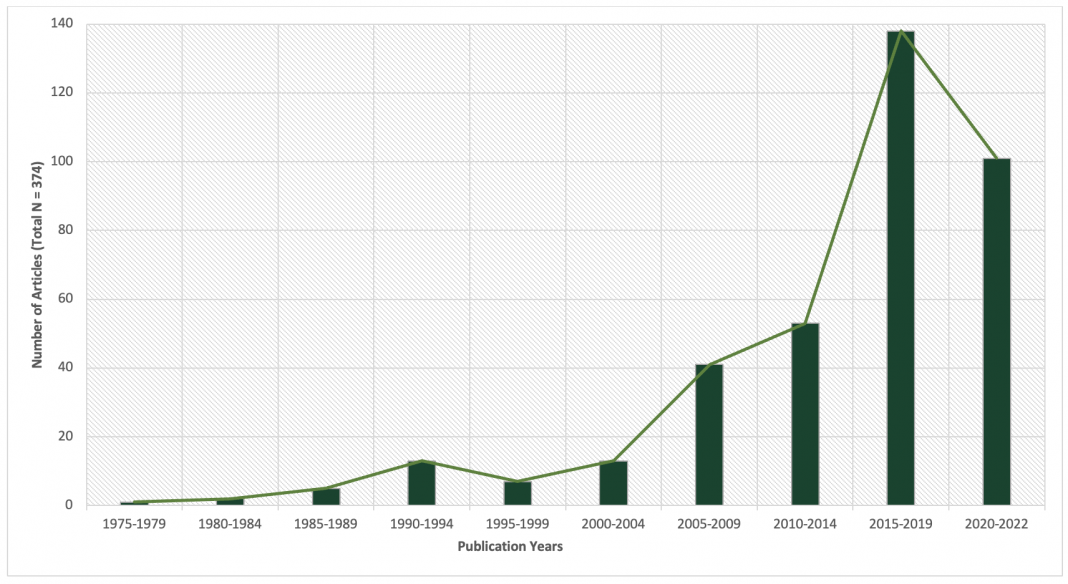Professors Jennings and Tonoyan distill prior research and chart avenues for future research
In two prior Open Access Government articles, Dr Jennifer Jennings from the University of Alberta and Dr Vartuhi Tonoyan from California State University, Fresno, shared findings from their research (with collaborator Dr Robert Strohmeyer from the University of Mannheim) on how sex-based labour market segregation affects women’s perceptions of entrepreneurship and innovativeness as entrepreneurs. Here, they summarise key takeaways from their review of the academic literature on the gender stereotyping of entrepreneurship.
Taking stock and mapping the momentum of gender stereotyping research
The bibliographic analysis conducted by Professors Jennings and Tonoyan unearthed 374 research articles on entrepreneurship published in peer-reviewed journals between 1976 and 2022 that explicitly referenced gender stereotypes, biases, or discrimination within their abstracts. As illustrated in the accompanying figure, an over-time plot study of these publications reveals a steady surge in scholarly interest, notably intensifying since 2000. Indeed, nearly two-thirds of the identified articles were published post 2015, indicating a sustained and burgeoning momentum in research on the topic with no apparent deceleration in sight.
Entrepreneurship is predominantly perceived and portrayed as ‘masculine’
Professors Jennings and Tonoyan reviewed the scholarly articles to assess the manner in which entrepreneurship tends to be gender-stereotyped. Their investigation revealed that entrepreneurship is commonly perceived and portrayed as a career choice aligned with stereotypically masculine traits such as risk-taking and agency (i.e., assertiveness and ambition). Entrepreneurs are often judged in regards to their alignment with these male-typed characteristics – even in gender-neutral or female-typed industries such as personal coaching or beauty and fashion.
Notably, perceptions of entrepreneurship as a male-typed endeavour are not only held by those who provide financing and other resources to start-up ventures. Such perceptions are also prevalent amongst the general public. Moreover, even entrepreneurs themselves tend to associate entrepreneurship with traditional masculine attributes.
Prior research further reveals that the masculinisation of entrepreneurial activity extends beyond portrayals within the business and general media. This characterisation is also evident in policy publications and university curricula, thereby solidifying the link between entrepreneurship and masculine ideals.
Real-life consequences of gender stereotyping in entrepreneurship
he review conducted by Professors Jennings and Tonoyan also highlights various real-life outcomes stemming from the gender stereotyping of entrepreneurship. Much research has documented the negative impacts on women’s intentions to pursue an entrepreneurial career and their actual likelihood of establishing businesses. Other studies showcase the challenges that women entrepreneurs typically face in securing funding from financial resource providers such as venture capitalists, business angels, and the government.
Prior research indicates that gender stereotypes also influence the composition of founding teams, the roles held by founders of different genders, entrepreneurs’ social networks, and the differential treatment received by female versus male business founders from other key stakeholders such as employees, customers, and suppliers. Recent studies are delving into the strategies that women employ to enhance their perceived legitimacy as entrepreneurs.
Suggestions for some paths worth pursuing in future research
Professors Jennings and Tonoyan propose three pathways for future research on the gender stereotyping of entrepreneurship: ‘Exploring intersectionality’; ‘charting masculine identities’; and ‘unveiling underlying rationales.’
Regarding the exploration of intersectionality, the authors advocate for deeper examination of how a founder’s gender interacts with other social identities, potentially magnifying or attenuating inequalities in entrepreneurial processes and outcomes. These identities might include overt attributes like race and age, as well as less overt ones such as religion and sexual orientation. Current research lacks insight into how these intersecting identities are likely to exacerbate or diminish gender-stereotypical perceptions held by various resource providers, along with the real-life consequences for entrepreneurs’ careers arising from these perceptions.
In relation to mapping masculinities, Professors Jennings and Tonoyan call for greater acknowledgment that male founders are not immune to gender norms. While past research has predominantly examined how stereotypes affect women entrepreneurs, less is understood about the likely repercussions for men who diverge from traditionally masculine traits, linked with entrepreneurial success. Are resource providers equally biased against men who display less masculine traits as they are against the women vanguards who challenge traditional masculine stereotypes in entrepreneurship? Answering queries such as this warrants further research.
With respect to unravelling underlying rationales, Professors Jennings and Tonoyan emphasise the importance of studying the economic, cognitive, and emotional mechanisms that contribute to the unequal treatment experienced by entrepreneurs based on their gender. While some studies have delved into mechanisms such as perceived gender-role incongruity and second-order gender beliefs, further exploration in this area is much needed. A deeper understanding of these mechanisms is pivotal for designing interventions aimed at mitigating and, hopefully, eradicating gender biases and discrimination in the context of entrepreneurship.
For more details on Professor Jennings and Tonoyan’s review and suggestions for research on the gender stereotyping of entrepreneurship, please see the full article published in the Entrepreneurship Research Journal


This work is licensed under Creative Commons Attribution-NonCommercial-NoDerivatives 4.0 International.


